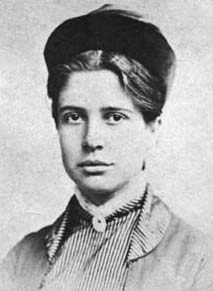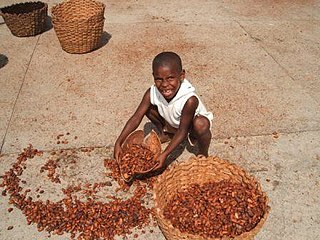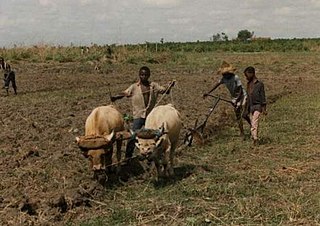
The Great Society was a set of domestic programs in the United States launched by President Lyndon B. Johnson in 1964 and 1965. The term was first referenced during a 1964 speech by Johnson at Ohio University, then later formally presented at the University of Michigan, and came to represent his domestic agenda. The main goal was the total elimination of poverty and racial injustice.

Child labour is the exploitation of children through any form of work that interferes with their ability to attend regular school, or is mentally, physically, socially and morally harmful. Such exploitation is prohibited by legislation worldwide, although these laws do not consider all work by children as child labour; exceptions include work by child artists, family duties, supervised training, and some forms of work undertaken by Amish children, as well as by Indigenous children in the Americas.

Child labor laws in the United States address issues related to the employment and welfare of working children in the United States. The most sweeping federal law that restricts the employment and abuse of child workers is the Fair Labor Standards Act of 1938 (FLSA), which came into force during the Franklin D. Roosevelt administration. Child labor provisions under FLSA are designed to protect the educational opportunities of youth and prohibit their employment in jobs that are detrimental to their health and safety. FLSA restricts the hours that youth under 16 years of age can work and lists hazardous occupations too dangerous for young workers to perform.
The term New Frontier was used by Democratic presidential candidate John F. Kennedy in his acceptance speech in the 1960 United States presidential election to the Democratic National Convention at the Los Angeles Memorial Coliseum as the Democratic slogan to inspire America to support him. The phrase developed into a label for his administration's domestic and foreign programs.

The Children's Health Insurance Program (CHIP) – formerly known as the State Children's Health Insurance Program (SCHIP) – is a program administered by the United States Department of Health and Human Services that provides matching funds to states for health insurance to families with children. The program was designed to cover uninsured children in families with incomes that are modest but too high to qualify for Medicaid. The program was passed into law as part of the Balanced Budget Act of 1997, and the statutory authority for CHIP is under title XXI of the Social Security Act.
The Children's Rights Movement is a historical and modern movement committed to the acknowledgment, expansion, and/or regression of the rights of children around the world. This act laid several constitutional laws for the growth of a child's mental and physical health.. It began in the early part of the last century and has been an effort by government organizations, advocacy groups, academics, lawyers, lawmakers, and judges to construct a system of laws and policies that enhance and protect the lives of children. While the historical definition of child has varied, the United Nations Convention on the Rights of the Child asserts that "A child is any human being below the age of eighteen years, unless under the law applicable to the child, majority is attained earlier." There are no definitions of other terms used to describe young people such as "adolescents", "teenagers" or "youth" in international law.

The Child Labor Amendment is a proposed and still-pending amendment to the United States Constitution that would specifically authorize Congress to regulate "labor of persons under eighteen years of age". The amendment was proposed on June 2, 1924, following Supreme Court rulings in 1918 and 1922 that federal laws regulating and taxing goods produced by employees under the ages of 14 and 16 were unconstitutional.

The National Child Labor Committee (NCLC) was a private, non-profit organization in the United States that served as a leading proponent for the national child labor reform movement. Its mission was to promote "the rights, awareness, dignity, well-being and education of children and youth as they relate to work and working."

Florence Moltrop Kelley was an American social and political reformer who coined the term wage abolitionism. Her work against sweatshops and for the minimum wage, eight-hour workdays, and children's rights is widely regarded today.

Olin DeWitt Talmadge Johnston was an American politician from the US state of South Carolina. He served as the 98th governor of South Carolina, from 1935 to 1939 and again from 1943 to 1945. He represented the state in the United States Senate from 1945 until his death from pneumonia in Columbia, South Carolina in 1965. He has become infamously remembered for denying clemency to George Stinney, a 14 year-old African American boy who was wrongfully sentenced to death in 1944 after a trial that lasted for one single day, a conviction overturned 70 years later.

Child labour is a recurring issue in cocoa production. Ivory Coast and Ghana, together produce nearly 60% of the world's cocoa each year. During the 2018/19 cocoa-growing season, research commissioned by the U.S. Department of Labor was conducted by NORC at the University of Chicago in these two countries and found that 1.48 million children are engaged in hazardous work on cocoa farms including working with sharp tools and agricultural chemicals and carrying heavy loads. That number of children is significant, representing 43 percent of all children living in agricultural households in cocoa growing areas. During the same period cocoa production in Cote d’Ivoire and Ghana increased 62 percent while the prevalence of child labour in cocoa production among all agricultural households increased 14 percentage points. Attention on this subject has focused on West Africa, which collectively supplies 69% of the world's cocoa, and Côte d'Ivoire, supplying 35%, in particular.
Bailey v. Drexel Furniture Co., 259 U.S. 20 (1922), was a United States Supreme Court case in which the Court ruled the 1919 Child Labor Tax Law unconstitutional as an improper attempt by Congress to penalize employers using child labor. The Court indicated that the tax imposed by the statute was actually a penalty in disguise.

Walter Marcus Pierce was an American politician, a Democrat, who served as the 17th Governor of Oregon and a member of the United States House of Representatives from Oregon's 2nd congressional district. A native of Illinois, he served in the Oregon State Senate before the governorship, and again after leaving the U.S. House. Pierce was an anti-Catholic supporter of compulsory public education and signed a law banning parochial schools, resulting in lawsuits and the United States Supreme Court case of Pierce v. Society of Sisters. He was also a eugenicist and supported Prohibition. He advocated unsuccessfully for a state income tax and vehicle license fee.

The Third Labour Government of New Zealand was the government of New Zealand from 1972 to 1975. During its time in office, it carried out a wide range of reforms in areas such as overseas trade, farming, public works, energy generation, local government, health, the arts, sport and recreation, regional development, environmental protection, education, housing, and social welfare. Māori also benefited from revisions to the laws relating to land, together with a significant increase in a Māori and Island Affairs building programme. In addition, the government encouraged biculturalism and a sense of New Zealand identity. However, the government damaged relations between Pākehā and Pasifika New Zealanders by instituting the Dawn Raids on alleged overstayers from the Pacific Islands; the raids have been described as "the most blatantly racist attack on Pacific peoples by the New Zealand government in New Zealand’s history". The government lasted for one term before being defeated a year after the death of its popular leader, Norman Kirk.

The Community Alliance For the Ethical Treatment of Youth (CAFETY) is an advocacy group for people enrolled in residential treatment programs for at-risk teenagers. The group's mission includes advocating for access to advocates, due process, alternatives to aversive behavioral interventions, and alternatives to restraints and seclusion for young people in treatment programs. They have also called for the routine reporting of abuse in residential treatment programs, as well as federal government oversight and regulation of residential treatment programs.

The New Deal was a series of programs, public work projects, financial reforms, and regulations enacted by President Franklin D. Roosevelt in the United States between 1933 and 1938 to rescue the U.S. from the Great Depression. It was widely believed that the depression was caused by the inherent market instability and that government intervention was necessary to rationalize and stabilize the economy.

Child labour in Africa is generally defined based on two factors: type of work and minimum appropriate age of the work. If a child is involved in an activity that is harmful to his/her physical and mental development, he/she is generally considered as a child labourer. That is, any work that is mentally, physically, socially or morally dangerous and harmful to children, and interferes with their schooling by depriving them of the opportunity to attend school or requiring them to attempt to combine school attendance with excessively long and heavy work. Appropriate minimum age for each work depends on the effects of the work on the physical health and mental development of children. ILO Convention No. 138 suggests the following minimum age for admission to employment under which, if a child works, he/she is considered as a child laborer: 18 years old for hazardous works, and 13–15 years old for light works, although 12–14 years old may be permitted for light works under strict conditions in very poor countries. Another definition proposed by ILO's Statistical Information and Monitoring Program on Child Labor (SIMPOC) defines a child as a child labourer if he/she is involved in an economic activity, and is under 12 years old and works one or more hours per week, or is 14 years old or under and works at least 14 hours per week, or is 14 years old or under and works at least one hour per week in activities that are hazardous, or is 17 or under and works in an "unconditional worst form of child labor".
Child labor in the Philippines is the employment of children in hazardous occupations below the age of fifteen (15), or without the proper conditions and requirements below the age of fifteen (15), where children are compelled to work on a regular basis to earn a living for themselves and their families, and as a result are disadvantaged educationally and socially. So to make it short, it is called child labor when it is forced.

Carlie Kotyza-Witthuhn is an American politician serving in the Minnesota House of Representatives since 2019. A member of the Minnesota Democratic–Farmer–Labor Party (DFL), Kotyza-Witthuhn represents District 49B in the southwestern Twin Cities metropolitan area, which includes the city of Eden Prairie and other parts of Hennepin County, Minnesota.

The American Rescue Plan Act of 2021, also called the COVID-19 Stimulus Package or American Rescue Plan, is a US$1.9 trillion economic stimulus bill passed by the 117th United States Congress and signed into law by President Joe Biden on March 11, 2021, to speed up the country's recovery from the economic and health effects of the COVID-19 pandemic and recession. First proposed on January 14, 2021, the package builds upon many of the measures in the CARES Act from March 2020 and in the Consolidated Appropriations Act, 2021, from December.















